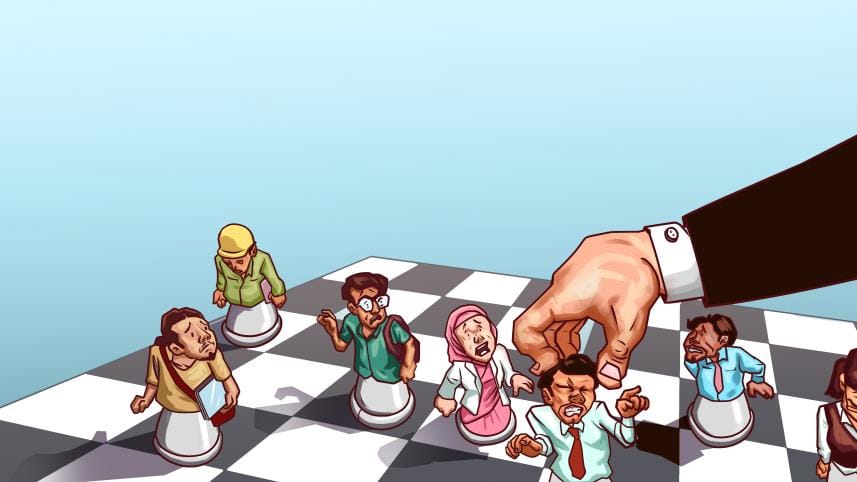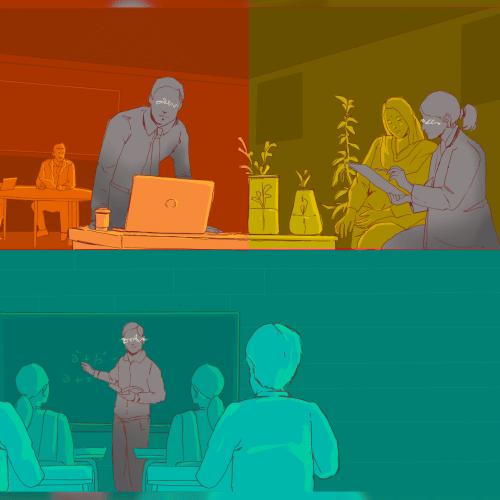Why do some people not like their jobs?

Find a job you enjoy doing, and you will never work a day in your life.
How much truth does this line hold, truly?
Most of us enter the workforce with passion and a purpose to make a difference. Instead, we find ourselves struggling to manage an unrealistic workload that outweighs the compensation, meet the ever-growing expectations of employers, and balance a social life that gets buried under overtime hours. Ultimately, giving in to a system where passion slowly fades and burnout is glorified.
The motivation to learn, build skills and grow with which we initially started begins to take a backseat.
This is not something that is reserved for particular professions or industries. Whether it's health care, education, or the corporate world, many young professionals are finding that the jobs they were once excited about have turned into these empty shells serving little fulfilment or sense of purpose.
When we asked a few professionals about how they felt about their jobs, they shared similar stories and experiences of failed expectations and a growing sense of futility. Ishrat Ahmed*, consultant nutritionist and dietitian at a reputed private hospital in Bangladesh states, "The lack of professional recognition and respect from clients makes my job feel undervalued."
Ishrat, who holds a master's degree in Food and Nutrition from a top public university in Dhaka, dreamed of improving people's lifestyles through her work. Now, as a Dhaka-based consultant nutritionist, her reality looks very different. She started with the expectations of making a real difference.
"To me, it wasn't just a job. I wanted to help people improve their health through my years of education on public health and nutrition, and build a strong patient-doctor relationship. I thought my job would help me gain more experience and expertise as a nutritionist. But now most of my time is spent making diet plans, charting and doing administrative tasks," she adds.
The job isn't entirely thankless for her, as there are still a few moments of fulfilment. "What keeps me going is observing my patients bringing about positive changes in their health and lifestyle," she says. But on the contrary, she mostly has to deal with clients who are resistant and unsatisfied.
"When it comes to health and nutrition, there's a lack of awareness. People expect me to give them some magical pill or diet plan that will transform them overnight. When I ask them to control proportions or substitute certain foods with others, they complain of having already heard it all before, and for me to say something new." She believes changes take discipline and trust, which many patients are unwilling to do. This later leads to shifting blame.
She wishes to spend more time in patient care instead of on paperwork, and for nutritionists to have proper professional standing. "We aren't just sidekicks to doctors; we have also studied and are qualified to do what we do. I love helping people, but the system drains that passion. If I had more support from the administration and time to do what I actually cared about, it would surely change the way I view my job."
Zarif Islam*, a Marketing graduate from a well-known private university, has always considered his job as a springboard to a promising career and a step towards financial independence. Zarif is now a management trainee at a major fintech company in Bangladesh, and he is concerned that the barrier between job and life outside of work is becoming increasingly blurred.
"Being financially independent was my primary motivation behind my first job, and it didn't disappoint on that front," he begins. At the beginning, his expectation seemed justified. The job started giving him financial stability, opportunities to gain skills, and the sense of pride that came along with working in Bangladesh's leading financial sector.
However, the independence came with a kind of exhaustion he hadn't anticipated. He says, "At first, it was just one or two long days. Then suddenly, every day felt the same. If I left home at 9 AM, I'd return at 9 PM, if so, then where's the time to do anything else?"
The exhaustion from the day impacts all parts of his life. "I come home too tired to talk or even think. My work makes me feel like I'm losing touch with myself, my family, and my social life is practically non-existent. This is the part I hate," he adds.
This leads him to wonder if this is how adult life is supposed to be, questioning the normalcy of his situation and whether everyone has accepted this. He mentions, "The job requires me to pull overtime, and ultimately end up with the same mundane routine every day. It feels as if I am living the same day on repeat."
Sahara Mahmud*, another Dhaka University (DU) graduate student, finds it difficult to enjoy her job. She just started working for one of the top mobile financial services (MFS) platforms. "Most of the time, I don't have much to learn, but I really want to learn the ins and outs of the work I do. I am required to perform the same tasks repeatedly," she regrets.

Because she has no incentives to be productive at work, she frequently feels demotivated. According to her, "I get demoralised because the toxicity feels unnecessary, and my colleagues lack motivation and frequently engage in corporate politics to kill time."
She often doesn't want to work there because of the unproductive culture, but she wants to do it to improve her résumé.
To Nabila Ahmed*, teaching has always come as second nature. She has been tutoring for as long as she can remember. What began as a part-time job tutoring school students while she studied eventually became a full-time career when she joined a leading edtech platform. She imagined herself pursuing her passion for teaching as a great learning and fulfilling experience for both the students and herself.
"I got into this profession because I genuinely love teaching. I still do, but now, half my time goes into things that have nothing to do with what I was passionate about. I constantly have to fulfil tasks not mentioned in my job description and have to carry the weight of the organisation's mismanagement."
For her, it's not just the amount of work – it's the sheer misalignment and misjudgement too. The biggest frustration for her is the lack of proper communication within the system.
Nabila further says, "Good ideas get lost, a lot of the work remains unfinished, and in the end, it's the students who suffer because of the mismanagement. The gap between her expectations and reality leaves her questioning how her love for teaching has ultimately been moulded into a corporate setting."
On whether salary made up for it, she shrugged, "The pay doesn't match the responsibilities we carry, but honestly, a lot of us stay because we can't risk leaving without something else lined up. And thus, feel stuck in an endless loop."
This is not uncommon among young people across the world. Given the increasingly worrying state of the economy, many young people are clinging to jobs they would have otherwise left for better opportunities. This conundrum has been called "job-hugging" by VICE citing Korn Ferry, an organisational consultancy firm.
According to the report, "Job hugging is the act of holding onto your current job for dear life because the alternative is staring into the void of unemployment for weeks or, maybe more realistically at this rate, months. The economy is teetering on the edge between not good and disastrous. There's almost no job growth, and if AI isn't swallowing your career whole, then it's chewing away at portions of your job description like a termite."
Asif Areefin*, like any other fresher, was also full of hope and joy when he joined his workplace, envisioning a role where he could grow, learn, and contribute to a team effort, utilising his degree in supply chain management to build his career.
He is now a supply chain executive at a renowned fast moving consumer goods (FMCG) multinational company in Bangladesh. "During the initial days when I joined, there was mentorship, room for growth, and appreciation for the work I did. It all felt like sunshine and rainbows, but slowly, the energy faded," he mentions.
Now, for Asif, most days feel like a monotonous repetition of the previous; he says, "As a newcomer, the workload is comparatively lower, but as it gradually began piling up, things started to take a turn. It's not that I haven't been able to meet up with the workload, but it's how the office environment has changed. The instructions are vague, and what output is expected is rarely made clear."
Asif also believes that junior positions like his are often placed in compromising situations where most of the blame is placed if anything fails to meet expectations. "Being one of the youngest in the team makes it harder for me, as I can't exactly call out anyone for being unfair. I just have to take it – the extra hours, the rude remarks, and the blame," he elaborates.
He acknowledges that the pay is decent; however, he states, "It does not buy peace or a work-life balance. The money helps, sure. But it doesn't cancel out how I have stopped enjoying the weekends because of the constant anxiety".
Entering the workforce after completing a bachelor's degree and having a stable income at the end of the month is a goal for most, but like Asif, such work environments take a heavy toll on one's mental health.
He further mentions how he once was excited and motivated about his job and all its career prospects, but now he isn't quite sure if he wants to pursue this corporate life after all. But well aware that the latter isn't an option for him, he does his job diligently and hopes for the best.
He says, "I started with motivation, but now I just feel like I need to survive my days. All I am doing now is getting through the week, somehow."
These stories highlight the escalating crisis among today's youth. People who once stepped in with passion and ambition at work now grapple with confusion, burnout, and a fading sense of purpose. Financial independence and career growth may have been the goals, but these can't compensate for the mental exhaustion, emotional fatigue, and personal sacrifices that many are compelled to make just to survive in their jobs. That's how people, who were once passionate about their jobs, slowly see their work turn into something they resent and eventually something they hate to do.
*Names have been changed to maintain confidentiality.
Silwat Quader is majoring in Economics at NSU, reach her at silwatquader@gmail.com
Nusrat Meherin Faiza is a writer, tutor, and chronic overthinker. Reach out to fuel her overthinking at nmfaiza15@gmail.com



 For all latest news, follow The Daily Star's Google News channel.
For all latest news, follow The Daily Star's Google News channel. 

Comments